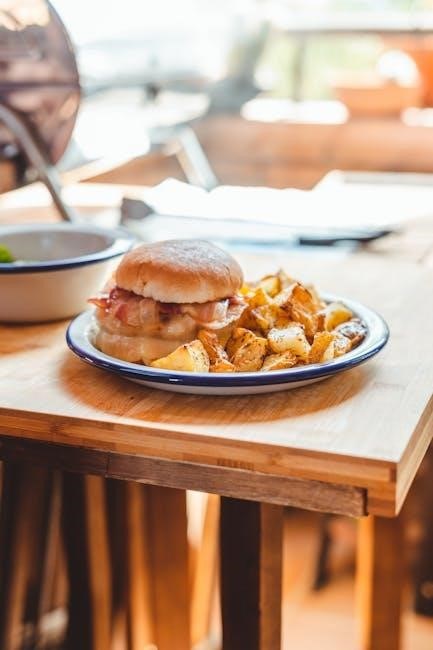
A structured 3000-calorie meal plan is designed for individuals aiming to gain weight or build muscle, providing balanced nutrition with proteins, carbs, and healthy fats.
What is a 3000 Calorie Meal Plan?
A 3000-calorie meal plan is a structured diet providing approximately 3000 calories daily, tailored for individuals aiming to gain weight or build muscle. It typically includes 5-6 meals spread throughout the day, with a balance of proteins, carbohydrates, and fats. The plan is often detailed in a PDF format for easy reference, outlining specific food portions and recipes. This approach ensures consistent caloric intake, supporting muscle growth and recovery. While 3000 calories is a common target, individual needs may vary based on factors like metabolism, age, and activity level. Tools like MyFitnessPal can help track progress and adjust the plan as needed.
Word count: 111
Who is this Meal Plan Suitable For?
The 3000-calorie meal plan is ideal for individuals seeking to gain weight or build muscle, particularly athletes, bodybuilders, and those with high energy needs. It’s also suitable for underweight individuals looking to add mass. The plan caters to men and women with active lifestyles, providing sufficient calories to support muscle recovery and growth. However, it’s essential to note that caloric needs vary; some may require more or fewer calories depending on factors like metabolism and activity levels. This meal plan is not recommended for those aiming to lose weight unless combined with specific training goals. Always consult a healthcare professional before starting any new diet.
Word count: 111
Benefits of a Structured Meal Plan
A structured 3000-calorie meal plan offers numerous benefits, including consistency, portion control, and time-saving organization. It ensures steady nutrient intake, essential for muscle growth and recovery. By planning meals in advance, individuals can avoid impulsive eating and stay on track with their goals. This approach also promotes balanced nutrition, guaranteeing adequate protein, carbohydrates, and fats for optimal energy and muscle development. Additionally, a structured plan can be budget-friendly, as it encourages bulk shopping and reduces food waste. It also provides accountability, making it easier to track progress and adjust as needed. Overall, a well-designed meal plan is a powerful tool for achieving weight gain and muscle-building objectives effectively and sustainably.
Word count: 111

Understanding Caloric Needs
Caloric needs vary based on factors like age, weight, height, and activity level. A 3000-calorie meal plan is tailored to support muscle growth and weight gain effectively.
Calculating Your Daily Caloric Requirements
Calculating your daily caloric needs involves considering factors like age, weight, height, and activity level. For weight gain, a caloric surplus is essential. A 3000-calorie meal plan is often recommended for those looking to build muscle, as it provides sufficient energy for growth. However, individual needs may vary, with some requiring more or fewer calories. Tools like MyFitnessPal can help determine your specific requirements. Adjustments can be made based on progress, ensuring the plan supports your goals effectively. This approach ensures a balanced intake of proteins, carbs, and fats, tailored to your lifestyle and objectives.
How 3000 Calories Support Weight Gain and Muscle Building
A 3000-calorie meal plan provides the necessary energy surplus for weight gain and muscle growth. This intake supports muscle recovery and hypertrophy, essential for bodybuilders. Adequate protein ensures muscle repair, while carbs fuel workouts, and fats support hormone production. A structured plan optimizes macronutrient balance, promoting lean mass gain. Consistency and progressive overload in training enhance results. This approach is ideal for those seeking a bulking strategy, ensuring sustainable progress toward physique goals.
Adjusting Calories Based on Activity Levels
Caloric needs vary based on activity levels, with sedentary individuals requiring fewer calories and highly active individuals needing more. A 3000-calorie meal plan is tailored for those with moderate to high activity levels, such as athletes or individuals engaging in regular workouts. For sedentary persons, this intake may exceed their needs, potentially leading to weight gain. Conversely, those with intense physical demands, like laborers or endurance athletes, may require additional calories to maintain energy balance. Adjustments should be made by monitoring weight changes and energy levels, ensuring the plan aligns with individual goals. Consulting a nutritionist can help fine-tune the calorie intake for optimal results.
Sample 3000 Calorie Meal Plan
A structured 3000-calorie meal plan includes balanced breakfast, lunch, dinner, and snack options, ensuring adequate protein, carbs, and fats for weight gain and muscle growth.
Breakfast Options
Start your day with high-calorie, nutrient-rich breakfasts to fuel muscle growth. Options include eggs, whole-grain pancakes, Greek yogurt, and smoothies. Add calorie-dense toppings like peanut butter, nuts, or seeds. Oatmeal with fruits and honey is another great choice. Protein shakes can supplement meals for extra calories. Avocado toast on whole-grain bread provides healthy fats. Consider a breakfast burrito with scrambled eggs, cheese, and sausage for a hearty start. MyFitnessPal.com offers tracking tools to ensure meals meet your 3000-calorie goal. Vary protein sources like eggs, cottage cheese, and turkey bacon to keep meals interesting. Pair breakfast with a glass of orange juice or milk for added calories.
Lunch Ideas
Lunch should be hearty and balanced, providing sustained energy. Grilled chicken or turkey wraps with whole-grain tortillas, loaded with veggies and hummus, are excellent options. Salmon or tuna salads with quinoa and avocado offer lean protein and healthy fats. A beef or lentil burger on a whole-grain bun with sweet potato fries is calorie-dense. Pasta dishes with lean meats or tofu, paired with garlic bread, can also meet calorie needs. Include a side of steamed vegetables or a fresh salad for fiber. Smoothies with protein powder, milk, and fruits can supplement meals. MyFitnessPal.com can help track calories and ensure meals align with your 3000-calorie goal. Vary protein sources and carb intake to maintain balance.
Dinner Recipes
Dinner should be rich in calories and nutrients to support muscle growth and recovery. Grilled chicken or beef stir-fries with brown rice and mixed vegetables are excellent options. Baked salmon with quinoa and roasted sweet potatoes provides lean protein and complex carbs. Meatballs or turkey meatloaf served with mashed potatoes and steamed broccoli are calorie-dense choices. Pasta dishes with ground beef or chicken, paired with garlic bread, can also meet dietary needs; Include a side salad or sautéed greens for added fiber. For variety, try slow-cooker chili with lean ground beef, beans, and corn. MyFitnessPal.com can help track macros and ensure meals align with your 3000-calorie goal. Vary protein sources and sides to maintain balance and satisfaction.
Snacks and Supplements
Snacks and supplements play a crucial role in meeting the high caloric demands of a 3000-calorie meal plan. Healthy snack options include nuts, dried fruits, protein bars, and trail mix, which are calorie-dense and convenient. For those struggling to meet their daily goals, mass gainer shakes or protein powders can be added between meals. Supplements like creatine and multivitamins can support muscle growth and overall health. MyFitnessPal.com recommends tracking these additions to ensure they align with your macronutrient goals. Incorporate snacks like Greek yogurt with honey or avocado toast for added calories and nutrients. Always choose nutrient-rich options to avoid empty calories.

Macronutrient Breakdown

Macronutrient Breakdown
A 3000-calorie meal plan balances macronutrients for optimal muscle growth and energy. Typical ratios include 40% carbohydrates, 35% protein, and 25% fats, ensuring balanced nutrition.
Protein Requirements for Muscle Growth
Protein is essential for muscle repair and growth, typically requiring 1.2-2.2 grams per kilogram of body weight daily; For a 3000-calorie meal plan, aiming for 150-200 grams of protein ensures sufficient intake. High-quality sources like chicken, fish, eggs, and dairy are ideal. Include protein-rich foods in every meal to maintain consistent muscle synthesis. Supplements like whey protein can help meet daily targets. Proper distribution of protein intake throughout the day supports optimal muscle recovery and growth, especially after workouts. Balancing protein with carbohydrates and fats ensures a holistic approach to bulking effectively.
Carbohydrates for Energy
Carbohydrates are the primary energy source for intense workouts, making them crucial in a 3000-calorie meal plan. Aim for 45-55% of total calories from carbs, focusing on complex sources like whole grains, fruits, and vegetables. These provide sustained energy and support muscle function. Include high-carb foods such as brown rice, oats, and sweet potatoes in meals. Simple carbs like bananas or juices can be consumed post-workout for quick recovery. Balancing carbs with protein and fats ensures optimal performance and recovery, while avoiding excessive sugar intake. Proper carb intake helps fuel workouts and supports muscle growth, essential for bulking effectively.
Healthy fats are essential for hormone production and overall health in a 3000-calorie meal plan. They account for 20-30% of total calories, with sources like avocados, nuts, and olive oil being ideal. These fats support energy production and enhance nutrient absorption. Incorporating fatty fish like salmon provides omega-3 fatty acids, which reduce inflammation and promote recovery. Avoid processed fats and focus on whole food sources. Balancing healthy fats with proteins and carbs ensures a well-rounded diet, supporting muscle growth and overall well-being. Proper fat intake is crucial for maintaining optimal health while bulking. A well-organized grocery list and meal prep strategy are vital for a 3000-calorie diet, ensuring consistency and reducing food waste. Plan meals weekly, shop for essentials, and prepare in advance to stay on track. A 3000-calorie diet requires nutrient-dense foods to support weight gain and muscle growth. Focus on lean proteins like chicken, fish, and beef, as well as egg whites and Greek yogurt. Complex carbohydrates such as brown rice, oats, and whole-grain bread provide sustained energy. Incorporate healthy fats like avocados, nuts, and olive oil to boost calorie intake. Include high-calorie snacks such as protein bars, smoothies, and dried fruits. Dairy products like milk and cheese are also beneficial. Vegetables like spinach and broccoli add essential vitamins and fiber. Ensure a variety of foods to meet macronutrient needs and keep meals balanced. Proper food selection is key to achieving goals effectively. To maintain a consistent 3000-calorie diet, effective meal prep is essential. Start by planning your meals for the week, ensuring each day meets your caloric and macronutrient goals. Batch cooking proteins, carbohydrates, and vegetables saves time and ensures availability. Portion meals in advance using airtight containers to avoid spoilage and maintain freshness. Incorporate high-calorie snacks like nuts or protein bars for easy grabs. Use a grocery list to stay organized and avoid missing key items. Label and date prepped meals for easy tracking. Additionally, schedule meal times to stay on track, and consider using a food scale for precise portion control. Consistency is key to achieving your dietary goals. Regularly monitor weight, measurements, and progress photos to assess growth. Use a food diary to log meals and ensure caloric intake aligns with goals. Utilize mobile apps to track macronutrients and stay accountable. Schedule weekly reviews to adjust the plan as needed for optimal results. Consistency and accurate tracking are vital for achieving muscle-building objectives effectively. A food diary is an essential tool for tracking daily calorie intake and ensuring adherence to the 3000-calorie meal plan. By documenting every meal, snack, and beverage consumed, individuals can monitor their macronutrient balance and stay accountable. This practice helps identify patterns, such as consistent caloric deficits or surpluses, and allows for adjustments to maintain progress. Digital apps like MyFitnessPal offer convenience, enabling users to log meals and calculate nutritional information efficiently. Regular reviews of the diary can reveal areas for improvement, supporting sustainable weight gain and muscle growth. Consistency in tracking leads to better adherence and overall success in achieving dietary goals. Tracking progress is crucial when following a 3000-calorie meal plan. Regularly measuring weight and body composition helps assess muscle growth and overall health. Use a weighing scale to monitor weekly weight changes, ensuring gains align with goals. Body fat percentage measurements can provide insights into lean muscle development. Tools like MyFitnessPal assist in logging meals and calculating macronutrient intake, ensuring adherence to the plan. Consistency in tracking allows for timely adjustments to calories or exercise routines. Progress photos and strength metrics can also serve as indicators of muscle growth. By maintaining a detailed record, individuals can optimize their approach, ensuring steady progress toward their objectives. This systematic approach fosters accountability and long-term success. A well-structured 3000-calorie meal plan promotes steady weight gain and muscle growth. Consistency, balanced nutrition, and regular monitoring ensure long-term success and achieving fitness goals effectively. Consistency is key to achieving your goals with a 3000-calorie meal plan. Track your progress using tools like MyFitnessPal to ensure you’re meeting your daily targets. Meal prep in advance to avoid missing meals and stay organized. Focus on balanced nutrition by incorporating lean proteins, complex carbs, and healthy fats into every meal. Stay hydrated throughout the day, as water is essential for digestion and muscle recovery. Listen to your body and adjust portion sizes or food choices if needed. Be patient, as muscle growth and weight gain take time. Celebrate small victories to stay motivated on your fitness journey.Healthy Fats in the Diet

Grocery List and Meal Prep Tips
Essential Foods for a 3000 Calorie Diet
Meal Prep Strategies for Consistency
Tracking Progress
Using a Food Diary
Monitoring Weight and Muscle Growth
Final Tips for Success